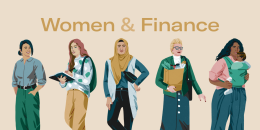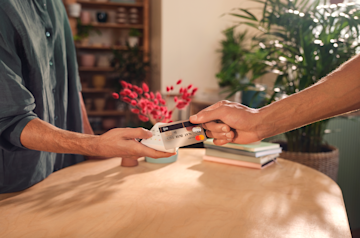
N26 x Patrizia Laeri—how to combat the gender money gap
What are gender money gaps and how can we combat them? Learn about this and much more in our interview with economics journalist Patrizia Laeri.
6 min read
Financial gaps in the lives of women, also called “gender money gaps,” are present at all ages and life stages. But which gaps exist, and what tools can we use to combat them? Furthermore, what steps can women take to become financially independent despite these obstacles? To find out, we sat down with economics journalist Patrizia Laeri, who founded the finance and media portal elleXX in 2021. In this interview, she talks about how she personally dealt with gender money gaps and how she believes our society can solve them. Our interview has been lightly edited for clarity. Enjoy!
The mission of elleXX is to close gender money gaps. Can you start out by explaining what these are? Gender money gaps start to impact women’s lives as early as when they receive pocket money—girls start receiving pocket money later than boys and they receive less overall—and continue all the way through their financial lives (e.g. the gender pay gap) and into their retirement (e.g. the gender pension gap). In the EU, this impacts over 40% of women. Old-age poverty is a women’s issue. It’s been proven that these gaps add up and in some cases reinforce one another. At elleXX, we’ve defined and analyzed nine of these money gaps. It’s a global phenomenon. We’re not only identifying them, we’ve also set ourselves the goal of closing these gaps and enriching women. Together with our partners, we’re offering solutions and want to redefine investing as sustainable, women-friendly, fair, and long-term. Our investment philosophy aims for financial returns, as well as inclusivity and diversity. That’s why “close the gaps” is our motto. How did these gaps come about in the first place? Oh gosh, it hurts every time I think of it. In Switzerland, women have only had the right for the last 35 years to open a bank account without their husband’s signature! This is the first generation that’s living with that right. How could women be expected to learn to manage their money and invest under these conditions? 56% of women in Switzerland aren’t able to support themselves financially. But the gender wealth gap isn’t just a Swiss phenomenon—it’s a massive, global problem. The systems cement it in place, whether it’s the pension and tax system or private companies and the gender pay gap. And it starts out with parents—albeit unconsciously—speaking differently with their sons about money than with their daughters. In your opinion, has enough been done to close these gaps? No, the gender pay gap is incredibly stubborn. The data on these gaps are sometimes not even collected. For example, with the gender property gap—how much land and real estate is owned by men in comparison to women? Here, individual studies point to a massive global disparity, but there’s nearly no hard data. We have a lot of work to do—it’s about fixing the system, not the women. Have you also experienced these gaps in your own life? If so, how? I’ve experienced wage discrimination, by a factor of five. This means I had to do the same work in one day for which my male colleagues were given five days. I tried to get this discrepancy paid attention to, but no one listened. In the end, I needed to escalate it. I worried a lot about this—I was already considered bold, and I worried about my job. Like many women, I had to learn to stand up for myself and my work. Even today, I tend to undersell myself. That’s why, in our company, we offer our members checklists for money and salary negotiations. In your opinion, what are the first steps that every woman can take to reach financial independence, despite the gender money gaps? Retirement planning and legal protection insurance. We have a fantastic retirement product in Switzerland, which offers tax incentives along with your investments. This product and our legal protection insurance are as much a part of financial wellness as regular visits to the gynecologist are of physical wellbeing. Women need to be able to defend themselves. They face so many challenges, from bullying and wage discrimination, sexism, maternity leave discrimination—all this can get really expensive, really quickly. A lawyer costs €400 an hour—legal insurance is much cheaper. In Germany and Austria, there are no state-subsidized private retirement insurance products, so as a first step, I would invest in diversified, sustainable ETFs (exchange-traded index funds), and ratchet up over time. Do you believe that in 50 years these gaps will have disappeared? If so, how can we get there? Just to repeat: Don’t fix the women, fix the system! On ellexx.com, we show how these gender money gaps—nine in total—came about and how we can close them. With social obstacles, it’s not enough to just draw attention to them—we need systemic change. So-called “gender budgeting” gives me a lot of hope. This is a process where tax money is distributed in a gender-equitable manner. But it’s not just on the output side: costs and procurement need to be linked to diversity factors. For example, the proportion of women in leadership positions—this would encourage companies to quickly promote women to top-level, better-paid roles. Outside of that, the billions in our pension system could have a great impact on these gaps. People are always talking about consumption, but we would have a much higher impact with investing through pension funds. According to a study from Aviva and WWF, if we invested our pension funds sustainably, we could accomplish 21 times more than if we avoided cars and flying and went vegan. Pension money is where the largest lever is, given how many billions are there. What if we invested that into sustainable, women-friendly projects? Then you’d have money flowing into sustainably-managed companies that offer equal opportunities. What do you think banks like N26 can do to help close gender gaps in the future? Work with us and other women-friendly finance products to create solutions together. We have the community, you have the technology—together we can pave the way forward. We believe in an innovation ecosystem—the best solutions come when we team up to create change.
Disclaimer: Shares, ETFs and funds referred to in the article are always subject to risks. Information provided in the article does not constitute any form of investment advice or recommendation to buy or sell securities or other financial instruments. All information provided is for educational and illustrative purposes only and represents exclusively the opinion of the author. None of this information constitutes a recommendation for a particular investment strategy. No liability can be assumed for its correctness. Should the readers adopt the offered contents as their own, make use of any information or follow any opinion referred to in the article, they act at their own risk.
The mission of elleXX is to close gender money gaps. Can you start out by explaining what these are? Gender money gaps start to impact women’s lives as early as when they receive pocket money—girls start receiving pocket money later than boys and they receive less overall—and continue all the way through their financial lives (e.g. the gender pay gap) and into their retirement (e.g. the gender pension gap). In the EU, this impacts over 40% of women. Old-age poverty is a women’s issue. It’s been proven that these gaps add up and in some cases reinforce one another. At elleXX, we’ve defined and analyzed nine of these money gaps. It’s a global phenomenon. We’re not only identifying them, we’ve also set ourselves the goal of closing these gaps and enriching women. Together with our partners, we’re offering solutions and want to redefine investing as sustainable, women-friendly, fair, and long-term. Our investment philosophy aims for financial returns, as well as inclusivity and diversity. That’s why “close the gaps” is our motto. How did these gaps come about in the first place? Oh gosh, it hurts every time I think of it. In Switzerland, women have only had the right for the last 35 years to open a bank account without their husband’s signature! This is the first generation that’s living with that right. How could women be expected to learn to manage their money and invest under these conditions? 56% of women in Switzerland aren’t able to support themselves financially. But the gender wealth gap isn’t just a Swiss phenomenon—it’s a massive, global problem. The systems cement it in place, whether it’s the pension and tax system or private companies and the gender pay gap. And it starts out with parents—albeit unconsciously—speaking differently with their sons about money than with their daughters. In your opinion, has enough been done to close these gaps? No, the gender pay gap is incredibly stubborn. The data on these gaps are sometimes not even collected. For example, with the gender property gap—how much land and real estate is owned by men in comparison to women? Here, individual studies point to a massive global disparity, but there’s nearly no hard data. We have a lot of work to do—it’s about fixing the system, not the women. Have you also experienced these gaps in your own life? If so, how? I’ve experienced wage discrimination, by a factor of five. This means I had to do the same work in one day for which my male colleagues were given five days. I tried to get this discrepancy paid attention to, but no one listened. In the end, I needed to escalate it. I worried a lot about this—I was already considered bold, and I worried about my job. Like many women, I had to learn to stand up for myself and my work. Even today, I tend to undersell myself. That’s why, in our company, we offer our members checklists for money and salary negotiations. In your opinion, what are the first steps that every woman can take to reach financial independence, despite the gender money gaps? Retirement planning and legal protection insurance. We have a fantastic retirement product in Switzerland, which offers tax incentives along with your investments. This product and our legal protection insurance are as much a part of financial wellness as regular visits to the gynecologist are of physical wellbeing. Women need to be able to defend themselves. They face so many challenges, from bullying and wage discrimination, sexism, maternity leave discrimination—all this can get really expensive, really quickly. A lawyer costs €400 an hour—legal insurance is much cheaper. In Germany and Austria, there are no state-subsidized private retirement insurance products, so as a first step, I would invest in diversified, sustainable ETFs (exchange-traded index funds), and ratchet up over time. Do you believe that in 50 years these gaps will have disappeared? If so, how can we get there? Just to repeat: Don’t fix the women, fix the system! On ellexx.com, we show how these gender money gaps—nine in total—came about and how we can close them. With social obstacles, it’s not enough to just draw attention to them—we need systemic change. So-called “gender budgeting” gives me a lot of hope. This is a process where tax money is distributed in a gender-equitable manner. But it’s not just on the output side: costs and procurement need to be linked to diversity factors. For example, the proportion of women in leadership positions—this would encourage companies to quickly promote women to top-level, better-paid roles. Outside of that, the billions in our pension system could have a great impact on these gaps. People are always talking about consumption, but we would have a much higher impact with investing through pension funds. According to a study from Aviva and WWF, if we invested our pension funds sustainably, we could accomplish 21 times more than if we avoided cars and flying and went vegan. Pension money is where the largest lever is, given how many billions are there. What if we invested that into sustainable, women-friendly projects? Then you’d have money flowing into sustainably-managed companies that offer equal opportunities. What do you think banks like N26 can do to help close gender gaps in the future? Work with us and other women-friendly finance products to create solutions together. We have the community, you have the technology—together we can pave the way forward. We believe in an innovation ecosystem—the best solutions come when we team up to create change.
Disclaimer: Shares, ETFs and funds referred to in the article are always subject to risks. Information provided in the article does not constitute any form of investment advice or recommendation to buy or sell securities or other financial instruments. All information provided is for educational and illustrative purposes only and represents exclusively the opinion of the author. None of this information constitutes a recommendation for a particular investment strategy. No liability can be assumed for its correctness. Should the readers adopt the offered contents as their own, make use of any information or follow any opinion referred to in the article, they act at their own risk.
Find similar stories
BY N26Love your bank
Related Post
These might also interest youLIFESTYLECould AI help you manage your money?86% of people are open to using AI for financial planning, but is it safe? Learn how AI is already transforming money management, and discover the pros and cons.
4 min read
LIFESTYLEUnderstanding tariffsFrom higher grocery bills, pricier electronics, and stock market swings, tariffs can impact your wallet and your investments.
5 min read
LIFESTYLEDe-hyping the no-spend challengeThis extreme challenge promises to transform your finances, but is it really the game-changer it claims to be?
4 min read


